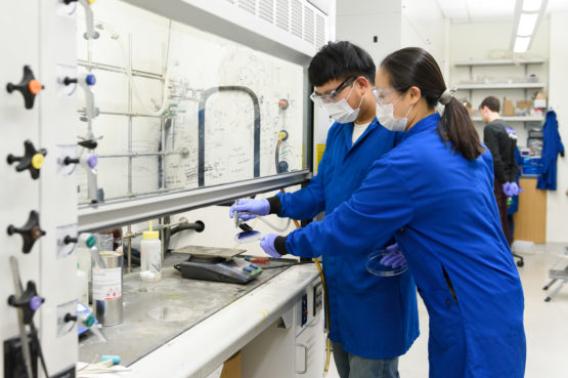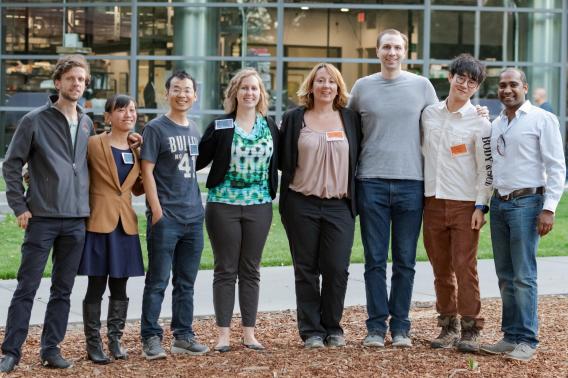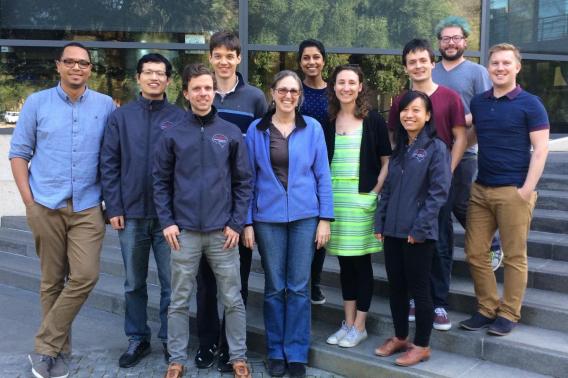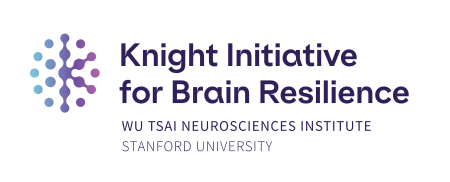Our postdoctoral scholars program provides research support and a community of mentors and peers to extraordinary Stanford postdocs advancing our understanding of the mind and brain in health and disease.
The Wu Tsai Neurosciences Institute's Postdoctoral Scholar Awards support innovative, collaborative and creative postdoctoral researchers from across Stanford who are pursuing novel, multi-disciplinary approaches to understanding the workings of the mind and brain. In addition to receiving research funding, scholars meet regularly for workshops, journal clubs and other activities that allow them to learn from one another’s varied research and personal backgrounds and establish community and collaborations. These Interdisciplinary Postdocs and Brain Resilience Scholars will advance our knowledge of brain health and aging.
Program Tracks
Interdisciplinary Postdoctoral Scholar Award
Since 2015, the Wu Tsai Neuro's Interdisciplinary Scholars track has supported innovative young researchers with backgrounds in basic and clinical neurosciences, biomedical sciences, physical sciences, social sciences, engineering, education, law, business and humanities who are engaged in cutting edge interdisciplinary research in the neurosciences, broadly defined.
Brain Resilience Postdoctoral Scholar Award
Since 2023, the Brain Resilience Postdoctoral Scholars award of the Knight Initiative for Brain Resilience supports trainees generating paradigm-shifting insights on the mechanisms of neurodegeneration and how to maintain brain resilience into old age.
Application
This program is open to current Stanford postdocs. Our next postdoc applications will open in summer 2024.
Funded Interdisciplinary Postdoctoral Scholar projects
Combining electrical and optical measurements on voltage-gated sodium channel toxins
Ion channels in the membranes of neuronal cells are the key regulators of neuronal signaling. An ion channel works as a gate that can open and close to allow specific molecules to enter or leave the cell. One important type of ion channels are voltage-gated sodium channels (NaVs), which are essential for many processes in our brain.
Enabling cell-based therapy of spinal cord injury through injectable hydrogels
Spinal cord injury (SCI) causes permanent damage to about 12,000 new patients in the US each year, primarily young adults. A common result of SCI is paralysis, and unfortunately, less than 1% of SCI patients have full neurological recovery by the time of hospital discharge.
How animals keep time annually: molecular mechanisms of the seasonal rhythm
Adaptation to environmental variations is vital for animal survival. While short-lived organisms face unpredictable environmental fluctuations, long-lived animals are subject to regular and generally drastic environmental changes across different seasons.
Structural analysis of chloride channel CLC-2
Membrane transport proteins are essential for life. They transport essential nutrients and minerals across the membrane barrier that surrounds each cell in the human body. This transport is necessary for every living process – from eating and breathing to learning and doing daily work.
Funded Brain Resilience Postdoctoral Scholar projects
Our Model
This program awards two years of fellowship funding and is pleased to provide parental leave. Postdoctoral scholars also receive $5,000 of discretionary research funds annually.
Mentorship
The program provides scientific and career-growth opportunities and guidance under the leadership of program co-directors and faculty mentors Professors Miriam Goodman and Liqun Luo. Scholars meet monthly with their cohort and program faculty mentors to share ideas and discuss approaches to scientific and career challenges, visit each other’s labs to learn about different research techniques and areas of study, and practice communicating their research to scientific and general audiences.
In addition, Brain Resilience Postdoctoral Scholars attend events and seminars hosted by the Knight Initiative for Brain Resilience, and are stewarded by Knight Initiative Associate Director Natasha Hussain and faculty mentor Elizabeth Mormino to learn from one another and build community around the topic of neurodegeneration and brain resilience.
Diversity
The Wu Tsai Neurosciences Institute Postdoctoral program brings together cohorts of postdocs representing the broad range of demographic, experiential and scientific diversity. Women and postdocs from groups underrepresented in the neurosciences are strongly encouraged to apply.
Learn more

Application and Eligibility Details
Carefully review the detailed information below if you are interested in applying to the Interdisciplinary Postdoctoral Scholars track or the Brain Resilience Postdoctoral Scholars track of the program.





